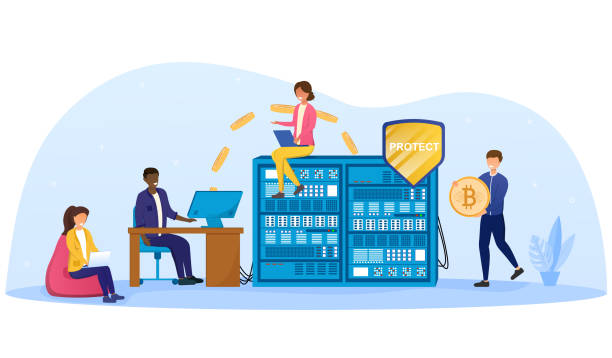Struggling to make your SaaS platform stand out? Many businesses face challenges with security, transparency, and managing digital transactions. These problems often slow growth and frustrate users who demand better solutions.
Blockchain APIs provide a practical method to address these issues. They enable SaaS platforms to incorporate advanced features like decentralized data management and cryptocurrency payments.
This not only enhances functionality but also fosters trust between you and your users.
In this guide, you’ll explore how Blockchain APIs function in SaaS, their benefits, and how to add them step-by-step. Interested in the details? Keep reading!
Contents
Importance of Blockchain API Integration in SaaS
Blockchain API integration enhances data security in SaaS platforms. It relies on decentralized ledger technology to minimize risks of unauthorized access or tampering. APIs create reliable connections between blockchain networks and software systems, ensuring real-time authentication of transactions.
By adopting this approach, SaaS providers safeguard sensitive user information while cultivating trust among users.
Businesses experience improved transparency by integrating blockchain APIs into their operations. Each transaction is recorded permanently within the distributed ledger, avoiding disputes or discrepancies.
As a result, industries like supply chain management and eCommerce achieve clear operational visibility.
Transparency builds trust; blockchain ensures it.
Core Blockchain API Types
Developers use different Blockchain APIs based on their project requirements. Each type serves specific functions and solves distinct challenges.
REST APIs for Blockchain
REST APIs simplify the process of interacting with blockchain networks. These APIs allow SaaS platforms to fetch data, write transactions, or interact with smart contracts using simple HTTP requests.
For example, businesses can request transaction histories or verify wallet balances without needing to deeply analyze complex blockchain protocols.
Many popular blockchain platforms support REST APIs to make them more accessible for developers and companies alike. Well-documented endpoints ensure smooth communication between systems while saving time on development.
This simplicity allows applications to easily incorporate features like cryptocurrency payments or decentralized identity management into their services.
WebSocket APIs for Real-Time Data
WebSocket APIs deliver blockchain data instantly without delays. These APIs establish a continuous connection between the user and server, allowing real-time updates on cryptocurrency transactions and smart contract events.
Traders can monitor price changes or transaction confirmations without refreshing their dashboards.
This approach makes tracking decentralized systems faster and more effective. For platforms managing high-frequency trades or payment processing, WebSocket APIs minimize latency significantly.
They also improve user experience by ensuring uninterrupted communication of essential updates like wallet balances or network activity.
Benefits of Integrating Blockchain APIs in SaaS
Blockchain APIs add a protective layer around sensitive data, making breaches less likely. They also strengthen user trust by establishing an open and accountable system.
Enhanced Security and Privacy
Blockchain APIs shield sensitive data with encryption, making it nearly impossible for hackers to interfere with transactions. Each action gets recorded on a decentralized ledger, offering exceptional protection against fraud and unauthorized access.
Decentralization eliminates single points of failure often targeted in traditional systems. Smart contracts ensure secure execution of agreements without third parties intruding or modifying information.
This keeps both businesses and their users safe while maintaining confidentiality.
Increased Transparency and Trust
Integrating blockchain APIs into SaaS platforms fosters transparency by maintaining records that are accessible and secure. Every transaction is logged on a distributed ledger, making it nearly impossible to alter without detection.
This builds confidence among users, especially in finance or supply chain management, where trust is crucial.
Smart contracts add another layer of reliability by automating agreements based on predefined conditions. Users can confirm terms themselves instead of relying solely on third parties.
With clearer processes and verifiable data, businesses enhance user relationships while reducing disputes over inconsistencies or errors.Every transaction is logged on a distributed ledger, making it nearly impossible to alter without detection. This builds confidence among users, especially in finance or supply chain management, where trust is crucial.
Similarly, financial traders rely on insights such as float rotation to measure how assets circulate in markets, drawing parallels to how blockchain reveals movement and ownership transparently across decentralized systems.
Seamless Cryptocurrency Payments
Processing cryptocurrency payments through blockchain APIs minimizes obstacles between buyers and sellers. It enables immediate transfers, eliminating traditional delays caused by banks or third-party platforms.
For traders, this results in quicker settlements without waiting for clearing days.
Blockchains accommodate a wide variety of digital currencies available globally. Platforms incorporate wallets to simplify transactions safely while reducing fraud risks. Clear records on distributed ledgers enhance trust during payment processing for both parties involved.
Decentralized Data Management
Transparent payment systems lay the groundwork for efficient data flow. Decentralized data management builds on this trust by distributing information across nodes rather than central servers.
This reduces risks like single points of failure and hacking.
Blockchain-based SaaS platforms allow businesses to maintain control over their sensitive information. Each transaction or update gets recorded on a shared ledger, ensuring accuracy and clarity.
Traders benefit from improved security while maintaining ownership of their digital assets.
Key Steps to Integrate Blockchain APIs
Start by choosing tools that fit your platform’s needs. Then, structure the system to handle interactions efficiently.
Choose the Right Blockchain Platform
Choose a blockchain platform based on your requirements. Some platforms specialize in secure cryptocurrency transactions, while others are strong at handling smart contracts or decentralized data management.
Ethereum is widely used for its reliable smart contract capabilities. Binance Smart Chain provides lower transaction costs, making it suitable for smaller businesses.
Evaluate the performance and supported programming languages of each platform. Systems like Solana are faster but may have less community support compared to established networks such as Bitcoin.
Align your SaaS objectives with features that enable easy API integration into your current framework.
Design System Architecture
A reliable system architecture serves as the foundation for connecting Blockchain APIs into SaaS platforms. Begin by outlining how blockchain nodes, APIs, and your platform will interact.
Establish clear data flow pipelines to handle transactions like cryptocurrency payments or smart contract execution effectively.
Focus on modularity in your design. Divide components such as API gateways, authentication layers, and data storage for decentralized management. Add security protocols to safeguard digital wallets or sensitive transactional data while planning for growth to accommodate increasing user demands smoothly.
Develop and Implement Smart Contracts
Write the code for smart contracts in a way that aligns with your platform’s objectives. These digital agreements automatically carry out tasks based on predefined conditions. Use Solidity if working with Ethereum or other blockchain-supported languages depending on your selected network.
Test the contract thoroughly in sandbox environments before deployment. Set clear terms to avoid disputes and ensure fairness for both parties involved. Consider gas fees during development, especially when managing cryptocurrency transactions or decentralized data handling workflows.
Ensure Scalability and Reliability
Build systems that can handle increasing users and transactions with ease. Select blockchain platforms known for high processing capacity, like Solana or Polygon, to manage large-scale operations efficiently.
Design infrastructure with load balancers and distributed servers to ensure consistent uptime during peak demand.
Test smart contracts thoroughly to prevent failures under pressure. Implement error monitoring tools for real-time issue detection and resolution. Use caching methods or rate-limiting strategies to enhance response times while maintaining consistent service quality.
Make reliability your priority by resolving potential bottlenecks in advance.
Challenges in Blockchain API Integration
Addressing blockchain API challenges requires a clear plan, careful execution, and a strong focus on preventing system issues—are you prepared to learn more?
Managing Rate Limiting and Caching
Rate limiting regulates the number of API requests users can make within a particular timeframe. This helps prevent server overload and maintains consistent performance. Platforms often establish limits based on user levels, such as free and premium accounts.
Effectively managing rate limiting ensures smooth operation during periods of high traffic or extensive data transfers.
Caching temporarily stores frequently accessed blockchain data to reduce repeated calls to APIs. It enhances response times and reduces pressure on servers. For instance, wallet balance checks or transaction histories benefit from caching as these details do not always change immediately.
Error Handling and Ensuring Reliability
Developers catch errors quickly by implementing effective monitoring tools. Clear error messages help identify issues fast. Logging systems record failed transactions, making debugging more efficient and transparent.
Building redundancy into the system prevents downtime during failures. Smart contracts should include fallback mechanisms for unexpected scenarios. Regular testing across environments strengthens reliability and trust in blockchain API integrations.
Addressing Regulatory and Compliance Issues
Businesses must navigate complex regulatory frameworks when incorporating blockchain APIs into SaaS platforms. Each country has its own rules on cryptocurrency, data usage, and digital identities.
Failing to follow these laws can lead to penalties or platform shutdowns. Working with legal experts who thoroughly understand blockchain compliance is essential for staying ahead of issues.
Managing user data responsibly is another important aspect of compliance. Blockchain’s transparency may conflict with privacy laws like GDPR in Europe or CCPA in California. Developers need to create solutions that safeguard sensitive information while meeting legal requirements.
Establishing clear audit trails can help foster trust with regulators and users alike.
Future of Blockchain APIs in SaaS
The demand for smarter, faster API solutions will keep growing in SaaS. Blockchain APIs may reshape industries like eCommerce and supply chain management through more secure transactions.
Advancements in Automation and OpenAPI Specs
Automation is reshaping blockchain API integration by simplifying repetitive tasks. With modern tools, developers set up workflows that manage cryptocurrency payments or data management without manual effort.
This reduces human error and accelerates processes across SaaS platforms.
OpenAPI specs are making integrations more efficient than ever. These standardized guidelines enable APIs to communicate clearly with applications. For SaaS providers, this means quicker deployment and fewer compatibility issues.
It also enhances interoperability between blockchain systems and traditional software environments.
Potential for New Revenue Streams
Expanding blockchain API integration into SaaS platforms creates new opportunities for generating income. Digital wallet services can charge transaction fees, ensuring steady cash flow.
Subscription-based models offering advanced cryptocurrency payment solutions appeal to businesses seeking convenient tools.
Blockchain-enabled SaaS can also serve industries like e-commerce and supply chain management. By offering decentralized data management, these platforms gain advantages over competitors while creating profit-generating features.
Conclusion
Blockchain APIs bring strength and adaptability to SaaS platforms. They enhance security, streamline payments, and build trust through transparency. By adopting them, businesses can maintain an advantage in a rapidly evolving digital world.
Integration may seem challenging at first but results in lasting benefits. Begin with small steps, learn over time, and see the opportunities expand




